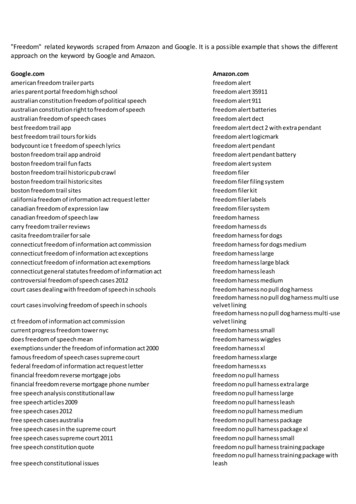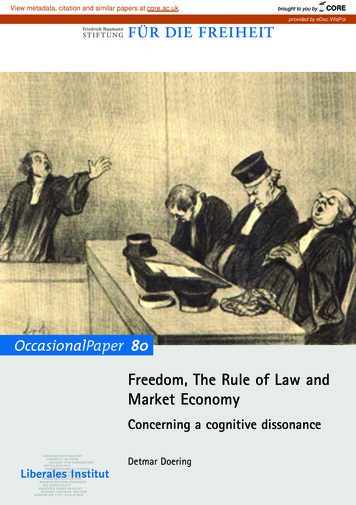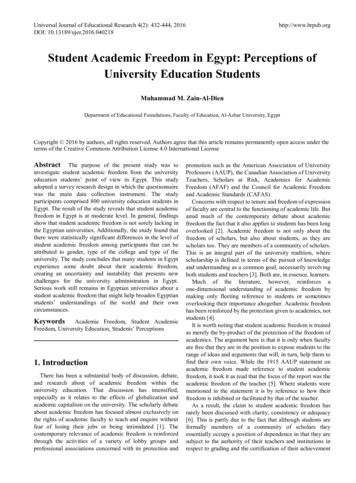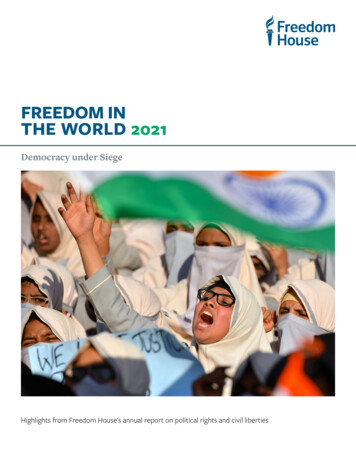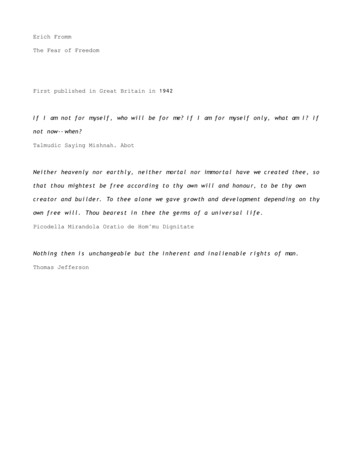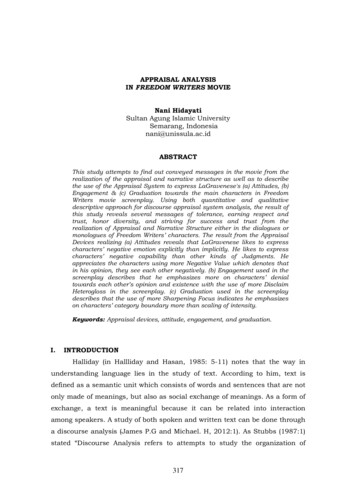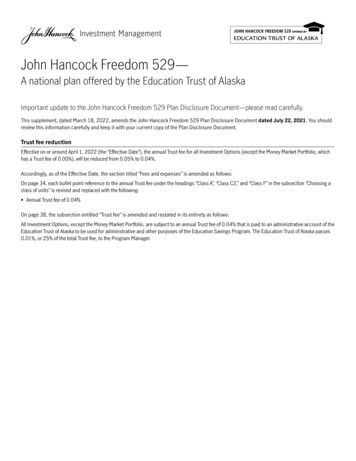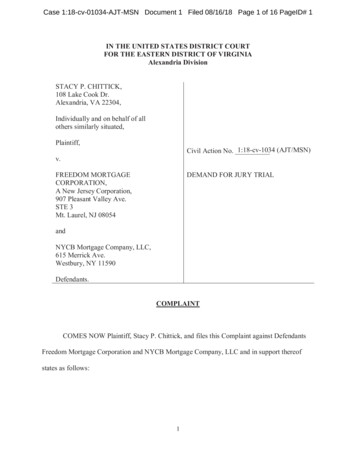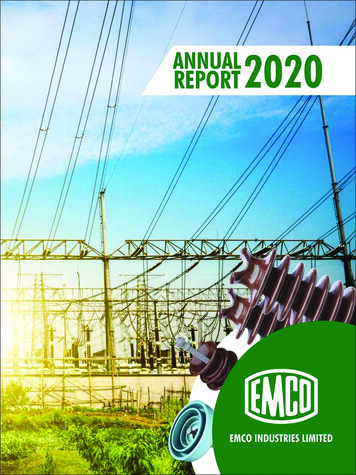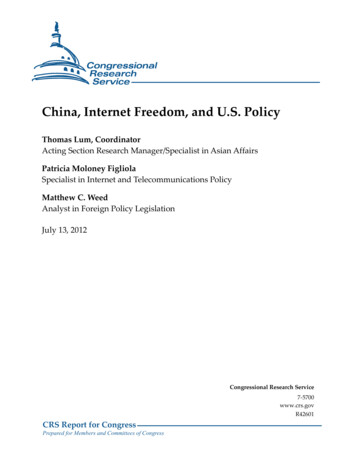
Transcription
Advocating Democracy & Human Rights2002Monitoring Freedom Supporting Democratic Reform Advocating Democracy & Human Rights Monitoring Freedom1319 18th Street, NWWashington, DC 20036Phone (202) 296-5101Fax (202) 296-5078www.freedomhouse.org Freedom HouseSupporting Democratic ReformFor more information,please contact:Freedom HouseAnnual Report 2002
SectionMessage from the President & Executive Director . . . . . . . . . . . . . . . . . . . . . . . . 4Overview of Freedom House ActivitiesIDevelopmentEconomic Freedom Supporting Democratic Reform . . . . . . . . . . . . . . . . . . . . . . . . . . . . . . . . . . . . . . . 6Supporting Civil SocietyDefending Human Rights and Safeguarding JusticePromoting Free and Professional MediaPromoting Open and Transparent GovernanceTapping American Expertise Development Democracy2002 HighlightsIIMonitoring Freedom . . . . . . . . . . . . . . . . . . . . . . . . . . . . . . . . . . . . . . . . . . . . . . 13Map of FreedomFreedom in the WorldNations in TransitPress Freedom SurveyIIIAdvocating Democracy and Human Rights . . . . . . . . . . . . . . . . . . . . . . . . . . . . 18Center for Religious FreedomCommunity of DemocraciesFreedom House and the United NationsMillenium Challenge Account DemocracyPageMessage from the Chairman . . . . . . . . . . . . . . . . . . . . . . . . . . . . . . . . . . . . . . . . . 2 Economic Freedom Today, Freedom House is a leading advocate of the world's young democracies, whichare coping with the debilitating legacy of statism, dictatorship, and political repression.It conducts an array of U.S. and overseas research, advocacy, education, and traininginitiatives that promote human rights, democracy, free market economics, the rule oflaw, independent media, and U.S. engagement in international affairs.DevelopmentIt has championed the rights of democratic activists, religious believers, trade unionists,journalists, and proponents of free markets. In 1997, a consolidation took place whereby the international democratization training programs of the National ForumFoundation were incorporated into Freedom House. Freedom House has vigorously opposed dictatorships in Central America and Chile,apartheid in South Africa, the suppression of the Prague Spring, the Soviet invasion ofAfghanistan, genocide in Bosnia and Rwanda, and the brutal violation of human rightsin Cuba, Burma, China, and Iraq.Economic FreedomOver the years, Freedom House has been at the center of the struggle for freedom. Itwas an outspoken advocate of the Marshall Plan and NATO in the 1940s, of the U.S. civilrights movement in the 1950s and 1960s, of the Vietnam boat people inthe 1970s, of Poland's Solidarity movement and the Filipino democratic opposition in the1980s, and of the many democracies that have emerged around the world inthe 1990s. Non-partisan and broad-based, Freedom House is led by a Board of Trusteescomposed of leading Democrats, Republicans, and independents; business and laborleaders; former senior government officials; scholars; writers; and journalists. All areunited in the view that American leadership in international affairs is essential to thecause of human rights and freedom.DemocracyFreedom House is a clear voice for democracy and freedom around the world. Foundednearly sixty years ago by Eleanor Roosevelt, Wendell Willkie, and other Americans concerned with the mounting threats to peace and democracy, Freedom House has been avigorous proponent of democratic values and a steadfast opponent of dictatorships ofthe far left and the far right.MISSIONFREEDOM HOUSE ANNUAL REPOR T 2002Mission StatementDemocracy and DevelopmentIVVContributors . . . . . . . . . . . . . . . . . . . . . . . . . . . . . . . . . . . . . . . . . . . . . . . . . . . . 22Financial Reports. . . . . . . . . . . . . . . . . . . . . . . . . . . . . . . . . . . . . . . . . . . . . . . . 23Combined Balance Sheet ( as of June 30, 2002 )Combined Statement of Activities and Changes in Net AssetsVIVIIBoard of Trustees . . . . . . . . . . . . . . . . . . . . . . . . . . . . . . . . . . . . . . . . . . . . . . . . . 25Office and Staff Directory . . . . . . . . . . . . . . . . . . . . . . . . . . . . . . . . . . . . . . . . . . 26Freedom House Annual Report 20021FREEDOM HOUSE ANNUAL REPOR T 2002ContentsTable of Contents
FREEDOM HOUSE ANNUAL REPOR T 2002Freedom and the expansion of democracy have rarely faceda more complex environment than that occurring in theaftermath of the September 11, 2001, terrorist attacks on theUnited States. The ensuing international war on terrorism hasposed important challenges for established democracies andfor those pressing for democratic change in closed societies.The United States and other democracies have had to grapplewith balancing the need to preserve basic freedoms and totreat their diverse populations justly, and the obligation toconduct thoroughgoing efforts to root out terrorist networksand infrastructures.Moreover, the global war on terrorism has placed new burdens on those seeking to change their closed and repressivepolitical systems. In the early days of the war on terror therewas a danger that the United States and other democracieswould soft-pedal pressuring repressive regimes to open uptheir political systems and respect fundamental human rights.Just as worrying was the exploitation by nondemocraticregimes of the global counterterrorism effort as a justificationof repressive measures against nonviolent groups.In this complex context, the role of nongovernmentalorganizations such as Freedom House assumes increasedimportance. Nongovernmental voices are an essential part ofa liberal democracy's system of checks and balances, the giveand take between those in power and those in whose namethe powerful act. For Freedom House, which focuses onmonitoring, studying, and promoting democratic change, theglobal war on terrorism creates new opportunities toinfluence governmental and private sector approaches to thedeepening and expansion of democracy around the world.In the last year, in addition to supporting a broad array ofdemocracy-promotion programs in Africa, Latin America, theArab world, Central and Eastern Europe, and Central Asia,Freedom House has emerged as an important national voicepressing for maintaining a broad-based commitment to theexpansion of democracy and the strengthening of the rule of2Message from the Chairmanlaw as key features of U.S. foreign policy. Our surveys on thestate of political rights and civil liberties and religious freedom, and our advocacy work, have provided an intellectualbasis for a consistent democracy agenda. Freedom House'sunique nonpartisan board, made up of conservatives, liberals,and moderates, has enabled us to champion the promotionof democracy and human rights on both sides of thepolitical aisle.In the mid-1990s, Freedom House advanced and promoted theidea of establishing a coalition of democratic states, an ideathat achieve fruition with the creation in June 2000 of theCommunity of Democracies. The second Community ofDemocracies meeting took place in November 2002 in Seoul,and Freedom House was integrally involved in deliberationsabout the countries that deserved to be invited on the basis oftheir respect for civil and political rights. Freedom House alsohelped plan a concurrent nongovernmental forum.A joint Freedom House-Council on Foreign Relations TaskForce, launched in cooperation with Council President LeslieGelb, has examined ways in which the world's democraciescan cooperate more effectively within the UN system.In recent years we have championed the idea that developingcountries that adhere to democratic practices be givena "democracy premium" of enhanced aid that will helpto strengthen the connections between democracy anddevelopment.We have been a key organization raising the issue of thedemocracy deficit in the Arab world and the urgent need tosupport democratic forces there. We have launched a range ofprograms to work with democratic reformers in Central Asiaand North Africa. In addition, our Center for ReligiousFreedom has been hosting a series of congressional dinnerswith experts in the Islamic world and is conducting a longterm study of extremist interpretations of Sharia (Islamic law),to explore the implications of that trend for preserving andpromoting human rights and democracy in those societies inwhich Sharia is introduced.Fortunately, there are signs the United States and otherdemocratic governments are listening to the views of civicgroups such as Freedom House. The strong U.S. response tothe sentencing of Egyptian democratic thinker and activistSaad Eddin Ibrahim and President George W. Bush’s pressureon Central Asian leaders to respect fundamental human rightsand create some space for free media and human rightsgroups are important first steps towards a much-needed focuson the democratic deficit in the Arab world.The administration has worked with the nine other democracies in the steering group of the Community of Democraciesto introduce criteria for membership in that emerginginternational organization. A number of countries havebeen downgraded from the status of full participants toobservers, while others have been entirely excluded fromparticipating in the Community of Democracies process. Suchsetting of standards deserves applause and encouragement.While the U.S. record is far from consistent—Russia's brutalprosecution of the war in Chechnya has unfortunately beendownplayed by U.S. authorities—there are signs of an increasing acceptance among key policy makers of the idea that theexpansion of democracy and the rule of law are crucial inbuilding a just and peaceful world order that can effectivelywithstand the appeal of terrorist movements and otherextremist ideologies.With my election as governor of New Mexico, I will beleaving the post of Freedom House chairman at the end of2002. I am immensely proud of our record of achievement andam proud to continue to serve on the Freedom House board.Above all, I am proud of the nonpartisan structure of FreedomHouse and the cooperation and spirit of common purposethat enables liberals, centrists, and conservatives to worktogether in the cause of global democratic change.I urge you to get to know Freedom House better and to joinin supporting a respected, 60-year-old organization at thecutting edge of efforts to promote democracy and freedomthroughout the world.Bill RichardsonChairman of theBoard of TrusteesFreedom House has long been an advocate of the positivelink between development and democracy that has beenreinforced this year by the UN Development Program and bythe Bush administration, which announced the creation of theMillennium Challenge Account, a new development programthat will distribute up to 5 billion annually in foreignassistance to states that "rule justly," invest in their ownpeople, and implement sound economic practices.These are important steps, but given the threats andchallenges that face democracy and freedom today, we mustall redouble our efforts to ensure that the democraticmomentum of the second half of the last century continues.Freedom House Annual Report 20023FREEDOM HOUSE ANNUAL REPOR T 2002Message from the Chairman
FREEDOM HOUSE ANNUAL REPOR T 2002The past year has created important new challenges andopportunities for Freedom House. Since the tragedy ofSeptember 11, 2001, we at Freedom House have worked,through our programs and advocacy efforts, to ensure thatdemocracy, rule of law, and human rights are strengthenedas the best way to counter the forces of fanaticism that arewilling to use terror against innocent civilians.Throughout the world, Freedom House programs areaimed at strengthening democratic institutions, supportingreform-oriented civic organizations, developing independentthink tanks and nongovernmental organizations, anddeepening the skills of local leaders who share a commitmentto democracy. Through these activities, we work not only tocurb rights violations, but to contribute to a sustainableinfrastructure of free institutions, including an uncensoredpress and a legal system that treats citizens fairly.We have increased our focus on the Middle East and theIslamic world. Part of our mission is being carried out onthe ground, through projects seeking to defend humanrights, strengthen civil society, develop a free press, andreform legal systems.In Uzbekistan, a repressive police state, Freedom House ishelping to encourage and train human rights defenders. InKyrgyzstan, Freedom House is organizing the purchase of aprinting press for the publication of uncensored newspapersand books. In Algeria, a country that is just now emergingfrom a decade of violent civil war and terror, Freedom Houseis working to advance judicial reform and press freedom. InMorocco, Freedom House is working with local organizationsto strengthen the system of human rights monitoring.In 2002, Freedom House honored Dr. Saad Eddin Ibrahimby presenting him in absentia with the first Bette Bao LordAward for Writing on Freedom. Dr. Ibrahim has been aleading voice for democracy and religious freedom in hishome country, Egypt, and in the Middle East generally formany years. Dr. Ibrahim has been jailed on concocted chargesby Egyptian authorities and Freedom House has been workingto publicize Dr. Ibrahim’s plight.4In addition, Freedom House has focused some of its researchon analyzing the roots of autocracy in the Middle East andother troubled regions. Our authoritative research publication, Freedom in the World, celebrating its 30th year, tooka close look at the factors behind the “freedom deficit” incountries with a Muslim majority. And Freedom House'sCenter for Religious Freedom has launched a major researchproject that examines the workings of extreme interpretationof Islamic Sharia law.We have also stepped up our advocacy efforts on behalf of anengaged U.S. foreign policy that places the promotion offreedom at the center of international initiatives. Key policymakers have shown a recognition that the expansion ofliberty is crucial to the defeat of terrorism and the spreadof economic prosperity. We were pleased to learn that theAdministration will use the analysis incorporated in FreedomHouse surveys as a source in determining participation in thenew Millennium Challenge Account, a new initiative that willprovide billions of dollars in new development assistance topoor countries that meet certain standards, including thoseconcerning respect for political rights and civil liberties.Freedom House has remained involved in the Community ofDemocracies, a project of biennial ministerial meetingsof more than 100 democracies that was launched in 2000 insignificant measure as a result of Freedom House advocacyefforts.Freedom House and the Council on Foreign Relations this yearestablished a nonpartisan task force to examine the functioning of the United Nations and America’s role in that body.The task force report stressed that the United States shouldestablish a coalition with other like-minded democraciesto advance the key goals of supporting democracy andadvancing human rights.In the coming year, Freedom House will continue its advocacyof the expansion of freedom and will continue to focus itsenergies on those parts of the world where freedom’sadvocates face their most difficult challenges. We havelearned the bitter lesson that the forces of tyranny andMessage from the President and Executive Directorpolitical extremism in some parts of the world can havedevastating repercussions for the freedom and security ofpeople everywhere. The challenges in the struggle forfreedom are immense. We are confident, however, that withour roster of programs Freedom House is well positioned tomake important contributions to the further expansion ofpolitical rights and civil liberties around the world.SLOVAKIAFH get-out-the-vote campaignhelps generate record voter turnoutin national electionsMEXICOFH project helps develop alternativedispute resolution programs throughout the countryKYRGYZSTANAdrian KaratnyckyPresidentFH trains human rights defendersand helps to establish independentprinting pressMOROCCOParliament adopts new penalprocedure code based in part onFH recommendationsJennifer WindsorExecutive DirectorUZBEKISTANFH opens Tashkent office to trainhuman rights defendersNIGERIAFH launches journalist-trainingworkshopsRUSSIAFH trains Russian journalists inreporting on ethnic minority issuesin the BalticsFreedom House Annual Report 20025FREEDOM HOUSE ANNUAL REPOR T 2002Freedom House 2002Global HighlightsMessage from the President and Executive Director
FREEDOM HOUSE ANNUAL REPOR T 2002Supporting Democratic ReformSupporting Civil SocietyGlobal Support for Civic ResistanceIn January 2002, Freedom House and the International Centeron Nonviolent Conflict held a workshop on the expansion ofglobal support for nonviolent movements. The seminar drewfrom the theoretical knowledge and experience of more than35 participants, including scholars, past and currentpractitioners from around the globe, and experts from theU.S. government and international nongovernmentalorganizations. Participants examined lessons from pastinternational action, new opportunities for internationalinvolvement, ways in which outside assistance can helpmovements mute repression, the need for outside trainingand material resources, and ways in which movements cancultivate international aid. Freedom House has sponsoredfollow-up training events focusing on specific lessons learnedfrom the experiences of Serb activists, which can serve asmodels for nonviolent strategies in conflict settings in Africaand other regions.Cuban Democracy Project (CDP)Cuba's pro-democracy movement reached a milestone in 2002when Todos Unidos, a coalition of dissident groups, gatheredmore than 10,000 signatures in support of a referendum on abroad political-reform program, known as the Varela Project.The petition’s success is a sign of the pro-democracymovement's growing maturity and organizational capacity. In2002 Freedom House's Cuban Democracy Project (CDP)provided targeted support to a number of pro-democracyinitiatives in Cuba. The CDP worked closely with democracyadvocates and nongovernmental organizations in Europe andLatin America to help bring their experience, skills, andresources to the aid of activists and organizations throughoutthe island. In addition, the CDP delivered books to Cuba'sindependent libraries, conducted civic education workshopswith community-based organizations in Cuba, and providedmaterial assistance to dissidents and independent journalists.Poland-America-UkraineCooperation Initiative (PAUCI)Freedom House's Poland-America-Ukraine CooperationInitiative (PAUCI) applies the best aspects of Poland's6Section I / Supporting Democratic Reformsuccessful transition to democracy to the situation in Ukraine.PAUCI is a trilateral initiative involving a broad range ofPolish, American and Ukrainian stakeholders, includinggovernment institutions, nongovernmental organizations,local governments, and other civic actors. Using a competitivegrant program as a funding mechanism, PAUCI has providedfinancial support to more than 80 projects engaging nearly200 partner institutions. As the border between Poland andUkraine becomes the eastern border of the European Union,the scope and importance of PAUCI will increase as an effective mechanism for building linkages, strengthening civilsociety, and ensuring lasting reform and economic growthin Ukraine.In 2002, PAUCI saw a considerable increase in projects promoting economic cooperation and commercial ties betweenPolish and Ukrainian businesses and institutions. Business-tobusiness exchanges supported the practical application ofPolish management and technical expertise in Ukrainianmedia companies, food processing plants, and tourismbusinesses. Chambers of commerce conducted trade missionsfocusing on specific sectors or geographical regions.Partnerships of independent think tanks carried out projectsdesigned to influence tax policy and improve the overallenvironment for small business development.In the coming years PAUCI will be institutionalized as a sustainable mechanism for supporting cross-border cooperationinvolving Ukraine, Poland, and neighboring countries.Partnership for Reform in Ukraine (PRU)Freedom House's Partnership for Reform in Ukraine (PRU)program assists Ukrainian think tanks in developing andpromoting public policies that advance democratic and freemarket reforms. The PRU places particular emphasis onimproving the capacity of think tanks to inform and influencepublic opinion and public policy. The program also linksUkrainian think tanks with counterpart organizationsthroughout Central and Eastern Europe—especially inPoland—and in the United States. Over the last four years, thePRU has supported 120 projects designed to shape policiesregulating freedom of the press, taxation, local governance,national security, and the nonprofit sector. In 2002 the PRUfocused its efforts on stimulating citizen involvement inelections (election regulations, media monitoring, campaignfinance, election observation, and voter education) andfunded research on civic activism and the state of civil society.Activities OverviewRegional Networking Project forCentral and Eastern Europe (RNP)Democratic Transition and Reintegrationin SerbiaWhile many countries of Central and Eastern Europe arebeginning to enjoy the fruits of a long struggle with postCommunist transition, reform has yet to take hold in othercorners of the region. Stability in the Visegrad group and theBaltic States continues to attract foreign investment andencourage steady economic growth. The Czech Republic,Hungary, and Poland have taken their seats on the NorthAtlantic Council, and the promise of further NATO andEuropean Union enlargement offers the genuine prospect ofEuropean integration to many more. Mass civic movements inSlovakia in 1998, Croatia in 1999, and Serbia in 2000 inspiredrecord voter participation and brought dramatic politicalchange through the power of the ballot. Meanwhile, manyparts of the region are still plagued by the heritage of the oldregimes. Government corruption continues to undermine therule of law, elections are neither free nor fair, journalistsdisappear, and ethnic divisions threaten regional stability.Emerging successfully from a decade of war, isolation,dictatorship and repression, Serbia has entered an era ofdynamic civic, social, and institutional development.According to Freedom House’s latest comparative survey ofEastern and Central Europe, Nations in Transit 2002, Serbia hasachieved the most significant improvement in democratization, rule of law, and economic liberalization of any ofthe 27 former Communist countries. Beyond monitoringdevelopments in Serbia, Freedom House has maintained acommitment to the country’s democratic development overthe last six years, during which the country has transformeditself into a developing democracy.To overcome this mixed picture of change, Freedom House’sRegional Networking Project (RNP) supports cross-bordercollaboration and joint projects between Central and EasternEuropean nongovernmental organizations. The RNP operateson the premise that transitional progress in the region mustcome from within the former Communist countriesthemselves, particularly among nongovernmental civil societyorganizations.Through a subgrant program targeted at civic activist organizations and policy-oriented think tanks––supplemented bycross-border exchanges, U.S.-based training, and Americanvolunteers––the RNP encourages initiatives led by nongovernmental organizations that join civic activism and policyadvocacy efforts across borders. Program priorities includeenhancing regional security and stability; advancing humanrights; furthering economic reforms; and developing youthengagement in regional policy issues.In 2002, Freedom House secured funding for four more yearsof regional networking. The next phase of the program willadvance the transition in the nations of the former SovietUnion and encourage cooperation among Central and EasternEuropean countries and Russia.Freedom House sponsored three non-partisan elections-related grantactivities to motivate citizens to vote and monitor the process in the firsttruly free and fair elections in Serbian history.Photo by Mike StaresinicFreedom House regional grants and exchanges continued tohelp Serbia’s new government, civil society, and media leadersembrace the challenges posed by transition. Working withmany partners—from grassroots nongovernmental organizations to the offices of the prime minister and president—Freedom House helped Serbia achieve many firsts in 2002: thefirst significant improvement in freedom of movementbetween the former enemies Croatia and Yugoslavia; the firstnew political partnerships between Serbia and Kosovo sincethe 1999 war; and development of a robust, networked civicsector that is tackling needed reforms. As Serbia continues itsFreedom House Annual Report 20027FREEDOM HOUSE ANNUAL REPOR T 2002II
FREEDOM HOUSE ANNUAL REPOR T 2002Supporting Democratic Reformcommitment to democratic reform and strives for inclusion inthe European Union, Freedom House will remain activelyengaged with its Serb partners.ContinuedGet out the vote volunteersat work in Slovakia.Photo by Jennifer WindsorSlovakia’s ElectionsParliamentary elections in Slovakia in September 2002 represented a watershed moment in the country’s short history ofindependence. With help from Freedom House, Slovak votersturned out in force to demonstrate their commitment todemocracy and the principles and values of NATO and theEuropean Union.In the end, the electorate returned to power a pro-reform,pro-Western coalition under Prime Minister Mikulas Dzurinda,who helped secure Slovakia's invitation to join NATO and theEuropean Union.Defending Human Rightsand Safeguarding JusticeRIGHTS ConsortiumSlovak campaign poster reads “It Matters To Us”Freedom House awarded more than 1 million to 42 leadingSlovak nongovernmental organizations to support nonpartisan election-related projects, including get-out-thevote and voter-education efforts, research and polling formessage development, and monitoring of media and politicalparty behavior. Two national media campaigns – "It Matters toUs" and "Save Your Voice (Vote) for September" – receivedinternational recognition.Freedom House also helped secure free prime-time airtime fora series of more than 30 TV and radio spots on all national andregional stations, and heavily discounted print ads in all thecountry’s major news publications.The campaigns kicked off in earnest in June and July,culminating in September with a series of high-profileconcerts, rallies, TV and radio spots, and discussion programsthat helped voters to make educated decisions among 26parties running for seats in the Slovak parliament.8Section I / Supporting Democratic ReformSince 1999, Freedom House's Rule-of-Law Initiative/GlobalHuman Rights Training and Support (RIGHTS) Consortium haspromoted human rights and the rule of law by strengtheningthe efforts of nongovernmental organizations, media outlets,legal professionals, and governments to improve judicialinstitutions and legal frameworks. In consultation withU.S. Agency for International Development and with theU.S. State Department, the program responds rapidly toemerging rule-of-law and human rights challenges with aflexible array of program tools tailored to indigenousconditions. Freedom House leads the Consortium, which alsoincludes the National Democratic Institute for InternationalAffairs and the American Bar Association.The RIGHTS Consortium has also developed technical tools toassess country compliance with international treaties on civil,political, and women’s rights; a software system and procedure for collecting and analyzing war crimes documentation;and training manuals on human rights monitoring, documentation, and reporting. Freedom House is currently developingthe Human Rights Defenders (HRDs) Assessment tool, whichwill help in the design of programs that assist HRDs.In 2002, the RIGHTS program was active in a range ofcountries in North Africa, Central Asia, Southeast Asia, LatinAmerica, the Balkans, and the Baltics.Activities OverviewAlgeriaWhile brutal violence in Algeria has eased somewhat since thegovernment’s 1998 “Civil Harmony” initiative, rule-of-law andhuman rights violations continue to be of great concern.Freedom House, in partnership with the American BarAssociation and the International Center for Journalists,continued its work in 2002 with nongovernmental organizations, legal professionals, judges, and independent media topromote judicial reform, freedom of the press, and accurateand professional reporting on human rights and rule-of-lawissues. The project combines U.S.-based internships andstudy tours with on-site training of journalists, lawyers,judges, victims’ rights groups, and human rights activists.Participants are now more actively engaged in the advocacyof judicial reform and victims rights including those ofthe disappeared. Private media still confront stricter penalsanctions for “insulting” government officials, but reportingon human rights violations has increased, a practice onceconsidered taboo.KyrgyzstanIn Kyrgyzstan's early stages of transition, President AskarAkayev promoted political and economic liberalization withgreat enthusiasm, and the international community regardedhim as one of Central Asia's more liberal leaders. Recently,however, he has turned increasingly to authoritarian measuresin the face of economic collapse, social unrest, and a growingdomestic opposition. While human rights defenders inKyrgyzstan are among the most developed in Central Asia,this repressive environment has limited their opportunities forprofessional development and advocacy. As a result, FreedomHouse began working with Kyrgyz human rights activists in
Freedom House is a clear voice for democracy and freedom around the world. Founded nearly sixty years ago by Eleanor Roosevelt, Wendell Willkie, and other Americans con-cerned with the mounting threats to peace and democracy, Freedom House has been a vigorous proponent of democratic values and a steadfast opponent of dictatorships of
